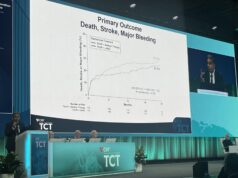
The first US randomised trial investigating the safety and efficacy on the use of a drug-coated balloon (DCB) for the treatment of coronary in-stent restenosis (ISR) has shown the superiority of the Agent (Boston Scientific) DCB compared to conventional balloon angioplasty for a primary endpoint of target lesion failure at one year.
Robert W Yeh (Beth Israel Deaconess Medical Center, Boston, USA) reported the findings of the AGENT IDE trial during a late-breaking trial session at the 2023 TCT meeting (23–26 October, San Francisco, USA).
“It turns out that despite improvements in drug eluting stent technology, in-stent restenosis is still quite common. In fact, 10% of all the PCIs [percutaneous coronary interventions] we do in the USA are for in-stent restenosis,” Yeh told Cardiovascular News. “We do not often have great treatments for those patients, some of those patients have multiple layers of previously placed stent, where you do not really want to put in an additional third, or maybe a fourth layer of metal, and so as a result of that, those patients even have high recurrent restenosis rates even if you do put in another stent, so we are really looking for new therapies to treat these patients.”
Yeh showed that the paclitaxel-coated Agent device demonstrated statistical superiority to uncoated balloon angioplasty (17.9% vs. 28.7%), a finding that elicited applause from the TCT Innovation & Clinical Science Theater audience.
The endpoint differences were predominantly driven by reduced rates of myocardial infarction related to the target vessel (TV-MI) and the need for a target lesion revascularisation (TLR) procedure. Overall, data demonstrated an approximate 38% relative risk reduction in TLF.
These data include the first 480 of 600 patients enrolled across 40 US sites. Within the patient population, 44% had multiple stent layers in the target lesion, and 51% were diabetic.
The AGENT DCB was approved in Japan in 2023 and received CE mark in 2014 for the treatment of patients with ISR and previously untreated small vessel coronary disease.
The technology was granted breakthrough device designation by the US Food and Drug Administration (FDA) in 2021, but presently there are no DCB technologies with FDA 510(k) approval for use in the treatment of coronary disease.













